Overview
This article delineates nine strategies essential for achieving effective mobile app marketing success. Among these strategies are:
- Leveraging social media advertising
- Forming influencer partnerships
- Fostering community building
Evidence supports the assertion that targeted marketing efforts—such as personalized ads and referral programs—can significantly elevate app downloads, enhance user engagement, and improve retention rates. Consequently, these approaches not only boost marketing effectiveness but also solidify the foundation for sustained growth in the competitive app landscape.
Introduction
The mobile app landscape is increasingly competitive, with millions of applications competing for users' attention. As businesses strive to carve out their niche, effective mobile app marketing strategies have become essential for success.
This article explores nine powerful techniques designed to elevate an app's visibility and enhance user engagement, from leveraging social media advertising to optimizing app store listings.
However, with so many options available, how can businesses identify which strategies will resonate with their target audience and drive meaningful results?
SDA: Custom Software Development for Effective Mobile App Marketing
SDA excels in custom software development, a crucial element for mobile app marketing that ensures the creation of applications that are not only functional but also strategically aligned with specific business goals. By incorporating advanced features and emphasizing customer-focused design, businesses can significantly enhance engagement and retention.
Customized solutions facilitate the implementation of unique promotional strategies in mobile app marketing that set an app apart in a crowded market, ensuring it effectively connects with the target audience. For instance, a mid-sized e-commerce company that adopted custom software, as detailed in the case study "E-Commerce Business Scales with Custom Software," saw a remarkable 40% increase in operational efficiency and a 25% rise in customer satisfaction, demonstrating the tangible benefits of personalized app development.
As mobile applications become essential to everyday life, the significance of mobile app marketing in developing customized experiences that address individual preferences cannot be overstated. This focus on customization not only enhances the success of mobile app marketing but also fosters long-term customer loyalty.
With the global custom software development market projected to grow at a CAGR of 10.3% by 2028, the relevance of is more significant than ever.
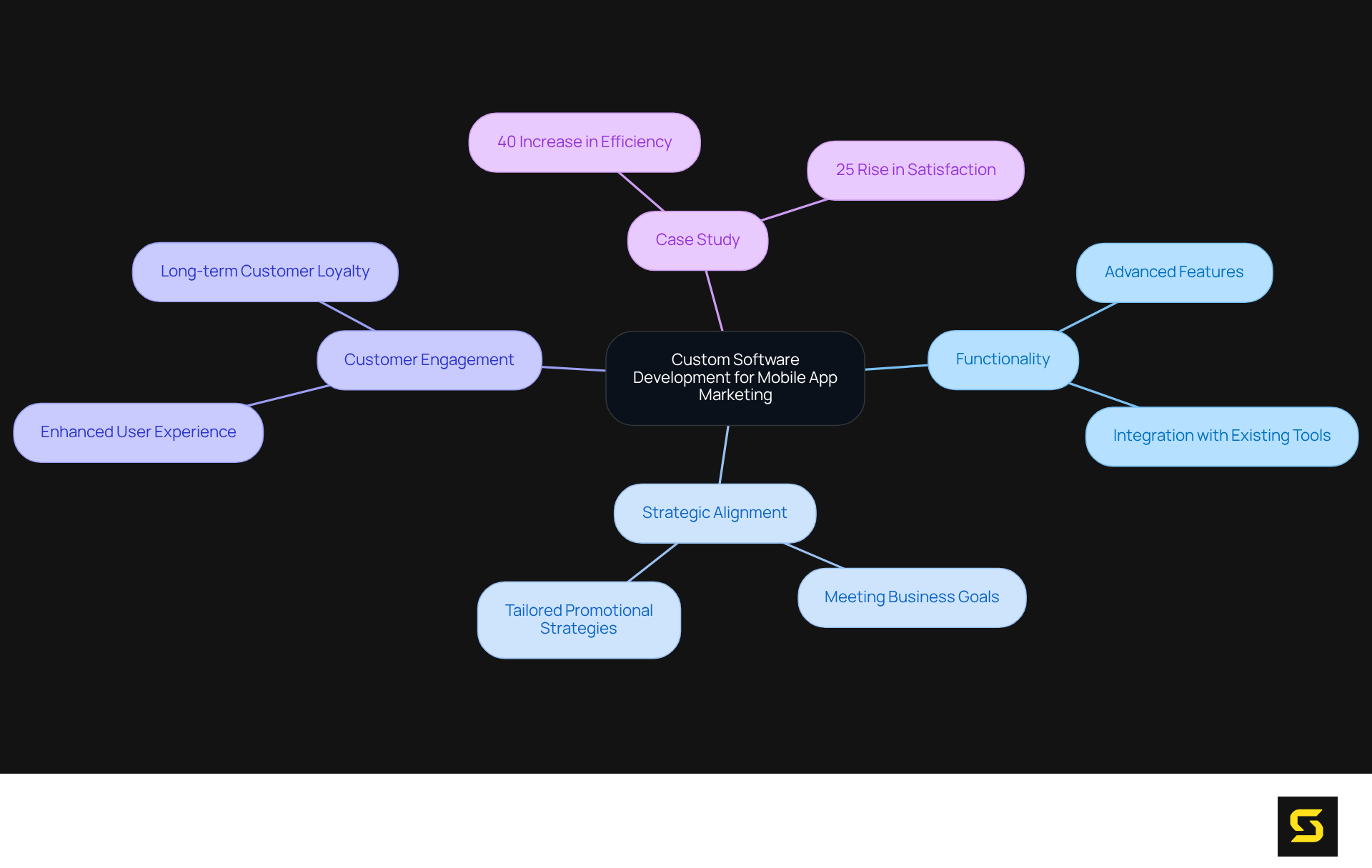
Leverage Social Media Advertising to Boost App Visibility
Leveraging social media advertising is essential for businesses aiming to enhance their mobile app marketing and drive downloads. With over globally, targeted advertising enables brands to connect with specific demographics and interests efficiently. For instance, Walmart's recent social media strategy, which involved engaging with 171 brand accounts during the Super Bowl, is part of a broader effort to enhance customer engagement and brand presence. This initiative resulted in a remarkable 50% increase in mobile app downloads week-over-week, showcasing the power of timely and relevant content.
Creating compelling ad content that emphasizes the app's unique features is crucial. Research indicates that advertisements tailored to individual preferences can increase conversion rates by as much as 300%. As noted, "ads that are personalized can increase conversion rates by up to 300%," reinforcing the importance of tailored messaging. Additionally, incorporating strong calls-to-action (CTAs) can enhance engagement, with studies showing that posts featuring effective CTAs can increase click-through rates by 20%.
Utilizing analytics tools to monitor ad performance is vital for refining marketing strategies. Brands that adjust their campaigns based on data insights can experience a considerable rise in client acquisition—up to 25%—highlighting the significance of ongoing optimization. Furthermore, 87% of marketers report success in using social platforms for paid advertising, particularly when targeting specific audience segments. Notably, social media advertising can achieve engagement rates up to 300% higher than traditional online ads, further emphasizing its effectiveness in driving app downloads.
Best practices for social media ads include:
- Testing various ad formats and content types to identify what resonates with the audience, as "testing different types of content, posting times, and messaging to see what resonates with your audience" is crucial.
- Engaging with users through interactive content, such as contests or user-generated content, which can significantly increase app visibility and downloads.
- Maintaining a consistent posting schedule to keep the audience informed and engaged.
By implementing these strategies, businesses can effectively leverage social media advertising for mobile app marketing to enhance their app's visibility and drive downloads, ultimately leading to greater success in the competitive mobile app market.
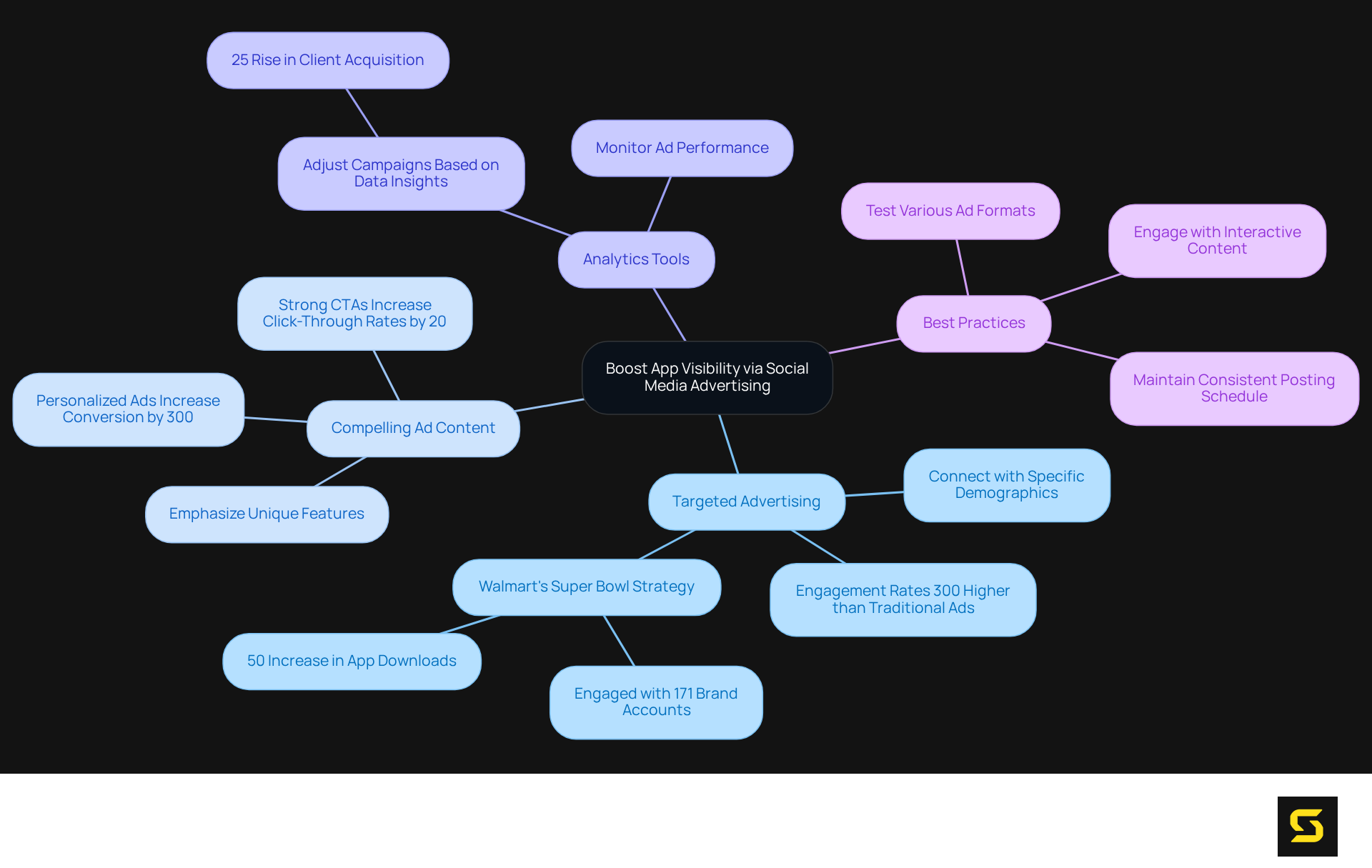
Utilize Influencer Partnerships for Enhanced User Engagement
Partnering with influencers who resonate with the app's target audience is a powerful strategy that can significantly enhance marketing efforts. These influencers possess the unique ability to create that showcases the app's distinctive features, effectively generating interest and driving downloads.
By leveraging their extensive reach, brands can tap into new audience demographics and cultivate a vibrant community around the app. Notably, influencer campaigns can lead to a remarkable 20% increase in audience retention compared to traditional advertising methods, as highlighted in the 2024 Influencer Marketing Report.
Furthermore, 70% of individuals discover new applications through social media, underscoring the essential role influencers play in enhancing app visibility. Engaging with influencers not only boosts initial downloads but also fosters ongoing engagement, solidifying this approach as a crucial strategy for achieving mobile app success.
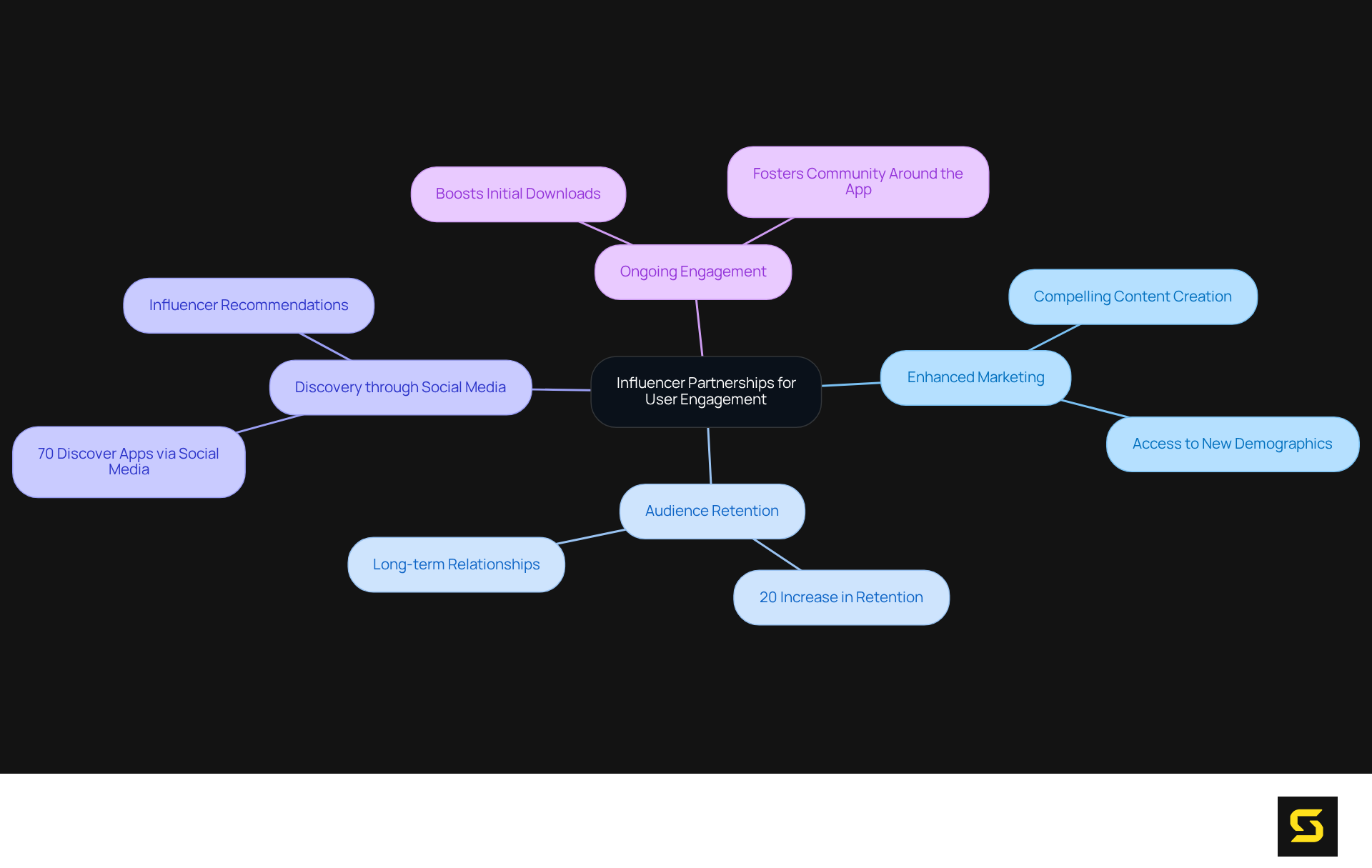
Optimize App Store Listings with Effective SEO Techniques
To enhance app store listings, businesses must prioritize as part of their mobile app marketing strategy to identify the terms that prospective customers are actively searching for. By crafting a compelling app title and description, coupled with high-quality visuals, businesses can significantly improve click-through rates through effective mobile app marketing.
Furthermore, consistently refreshing mobile app marketing with new functionalities and addressing user feedback not only enhances visibility but also builds trust among users. This strategic approach will position your app for greater success in a competitive marketplace.
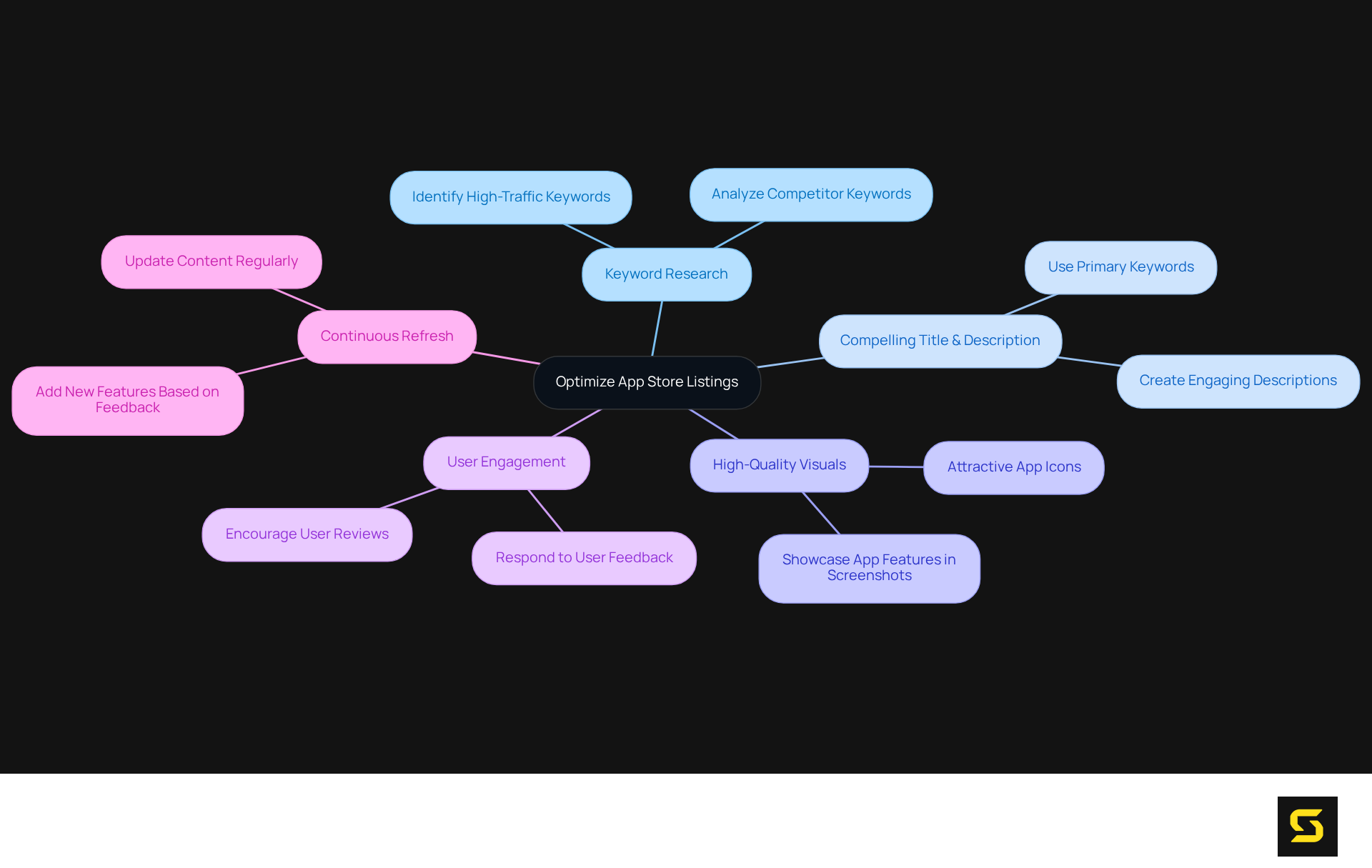
Implement Targeted Email Marketing Campaigns for User Retention
Executing focused email marketing campaigns is essential for companies aiming to engage directly with their audience. By providing tailored content based on individual actions and preferences, businesses can significantly enhance user interaction. Regular updates, exclusive offers, and timely reminders not only keep users engaged but also motivate them to return to the app. Furthermore, highlighting software updates in emails can accelerate the adoption of new features, making users more inclined to explore what’s available.
Dividing the email list according to user activity can dramatically improve campaign effectiveness, as behavior-based emails generate engagement rates that are three times higher than generic scheduled blasts. With 65% of all email opens occurring on mobile devices, it is imperative that emails are . Automated campaigns, in particular, can yield an impressive 320% greater ROI compared to standalone emails. These campaigns can be strategically configured to remind users about subscription renewals and emphasize features they may not be utilizing.
Consistently maintaining the email list is crucial for enhancing open rates and ensuring that messages reach engaged recipients. This makes targeted email marketing an indispensable component of any strategy for mobile app marketing. By implementing these strategies, companies can not only retain their audience but also foster a deeper connection that drives long-term engagement.
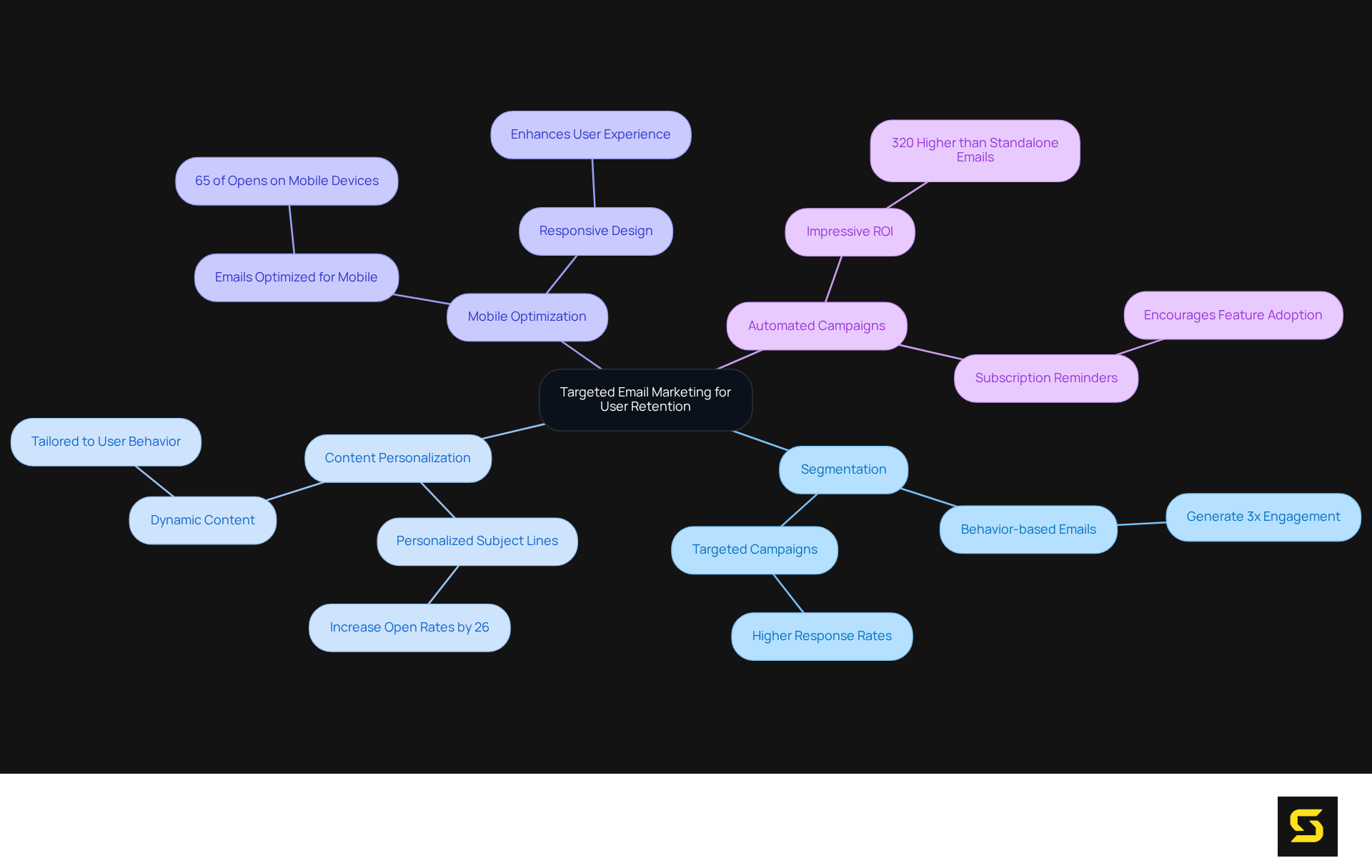
Create Engaging Content to Educate and Attract Users
Producing captivating material—such as blog articles, videos, and infographics—plays a crucial role in mobile app marketing by informing potential users about the app's features and advantages. This content can be across various platforms, effectively driving traffic to the app's landing page. Furthermore, the incorporation of user-generated content not only enhances authenticity but also fosters community engagement, creating a more robust user experience. By prioritizing these content strategies, we improve mobile app marketing to achieve greater visibility and user connection.
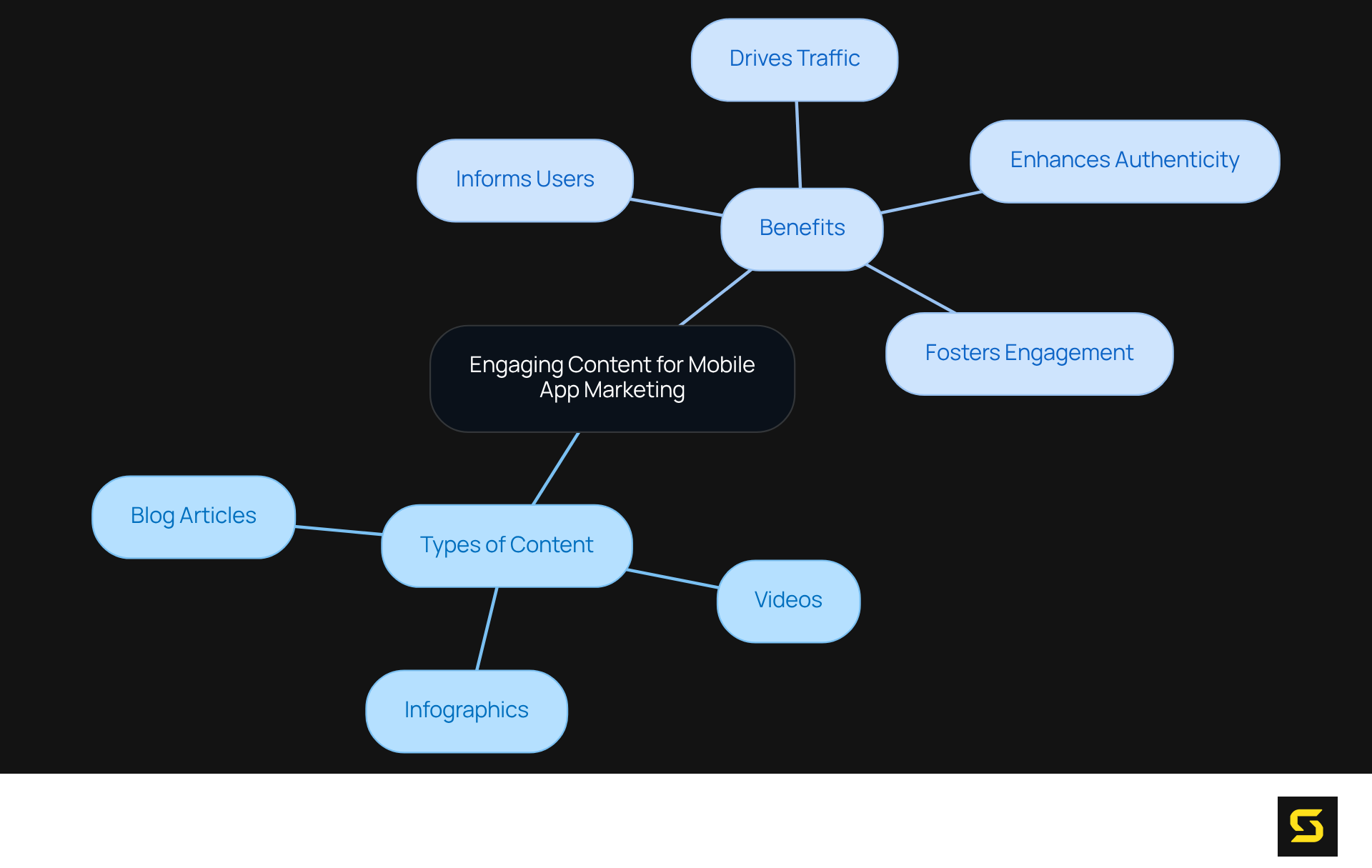
Analyze User Data to Refine Marketing Strategies
Regular analysis of client data is crucial for businesses striving to uncover trends and patterns in consumer behavior. This understanding empowers businesses to refine their , tailoring campaigns to better meet user needs. By leveraging analytics tools, companies can diligently monitor key performance indicators (KPIs) and assess the impact of various promotional channels.
For instance, Coca-Cola's Daha Daha app campaign achieved an impressive 46 percent increase in transactions through mobile app marketing by utilizing first-party data for personalized targeting, underscoring the power of data-driven strategies. Similarly, TikTok's trials in mobile app marketing led to an 80 percent reduction in cost per install (CPI) and a remarkable 4.8 times improvement in conversion rates, demonstrating how analytics can optimize promotional efforts.
As Marissa Mayer aptly stated, 'the sooner an organization starts collecting data, the sooner they can benefit from its insights.' This proactive approach to data collection not only enhances engagement but also drives overall business growth. Furthermore, insights from Bolt's use of Mixpanel's retention reports demonstrate how analytics can aid businesses in improving customer retention and refining their mobile app marketing strategies.
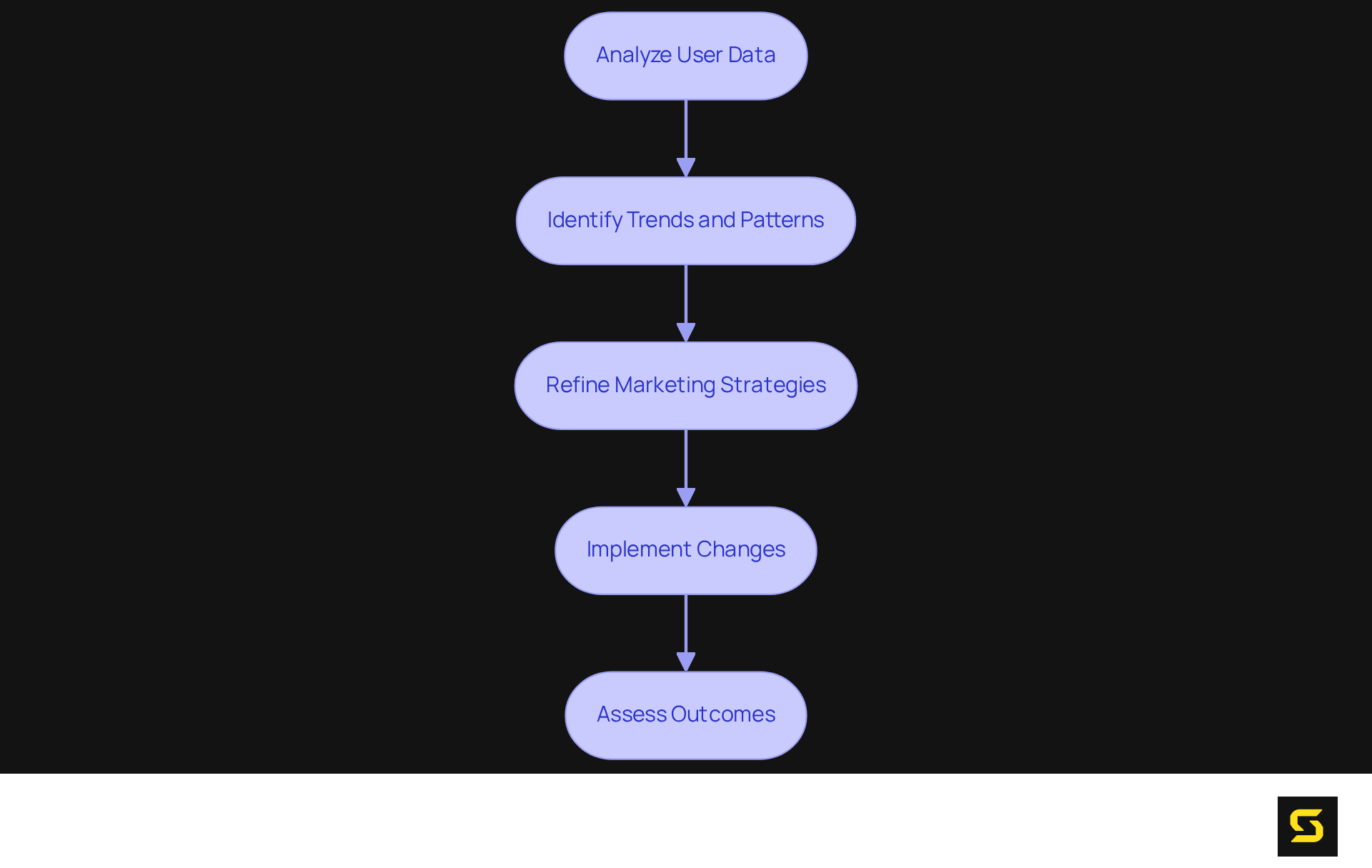
Develop Referral Programs to Encourage User Growth
Establishing a referral program that incentivizes individuals for attracting new clients is a powerful strategy for driving organic growth through mobile app marketing. By offering compelling incentives—such as discounts, exclusive features, or even surprise rewards—users are significantly more inclined to share the app within their networks. Research reveals that referred customers not only exhibit a 37% higher retention rate but also tend to spend 31% more on their first purchase, making referrals a highly cost-effective acquisition channel. In fact, referral marketing reduces customer acquisition costs by 35%, underscoring its immense value.
To , effective promotion is essential. Utilizing in-app notifications and targeted email campaigns can greatly enhance visibility and participation. Furthermore, integrating gamification features, such as leaderboards or tiered rewards, can elevate engagement and motivate individuals to refer additional friends. Studies indicate that gamified referral programs experience up to 28% higher engagement rates, demonstrating the effectiveness of making the referral process enjoyable and competitive.
Moreover, implementing a double-sided referral program, which rewards both the referrer and the new customer, can significantly boost participation. This approach not only fosters goodwill but also enhances customer satisfaction, as both parties feel appreciated. Businesses with robust referral programs report a 27% higher customer satisfaction score, highlighting the importance of this strategy. Given that mobile referrals account for 72% of all referrals, implementing effective mobile app marketing to optimize your program for mobile devices is imperative. By aligning your referral strategies with client expectations and preferences, you can create a robust program that encourages sustainable growth and cultivates a community of passionate supporters for your app. As Aya Musallam emphasizes, promoting referral programs through diverse channels is crucial for maximizing their effectiveness. Consider implementing these strategies to enhance your referral program and drive growth in participants.
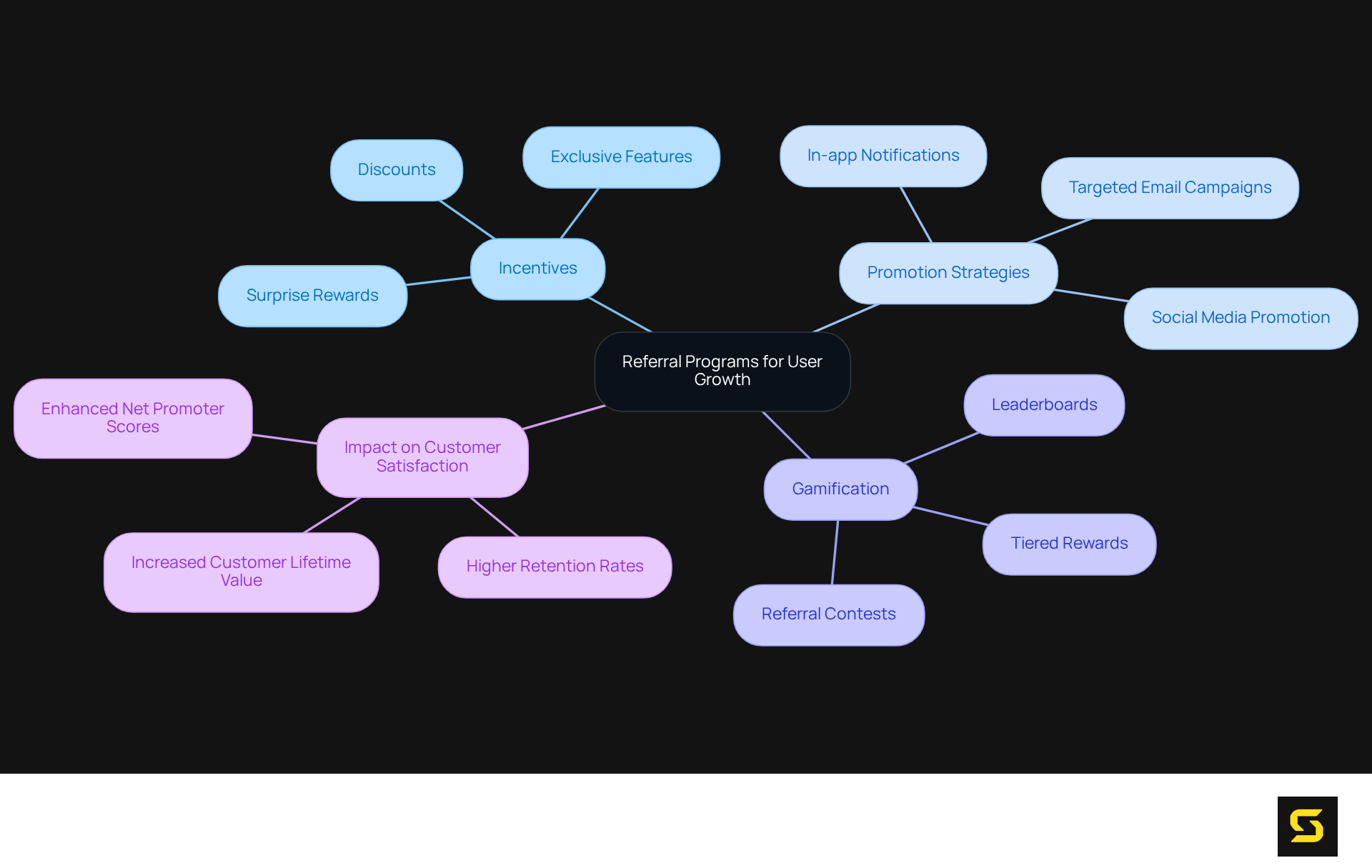
Launch Promotions and Discounts to Drive Downloads
Launching promotions and discounts is a strategic move in mobile app marketing aimed at encouraging potential customers to download the app. By offering limited-time discounts or exclusive in-app purchases, you can create a compelling sense of urgency that drives action.
Promoting these offers through social media, email marketing, and in-app notifications is a key aspect of mobile app marketing that not only maximizes their reach but also enhances their effectiveness. This multifaceted approach ensures that your promotions resonate with your target audience, leading to increased downloads and .
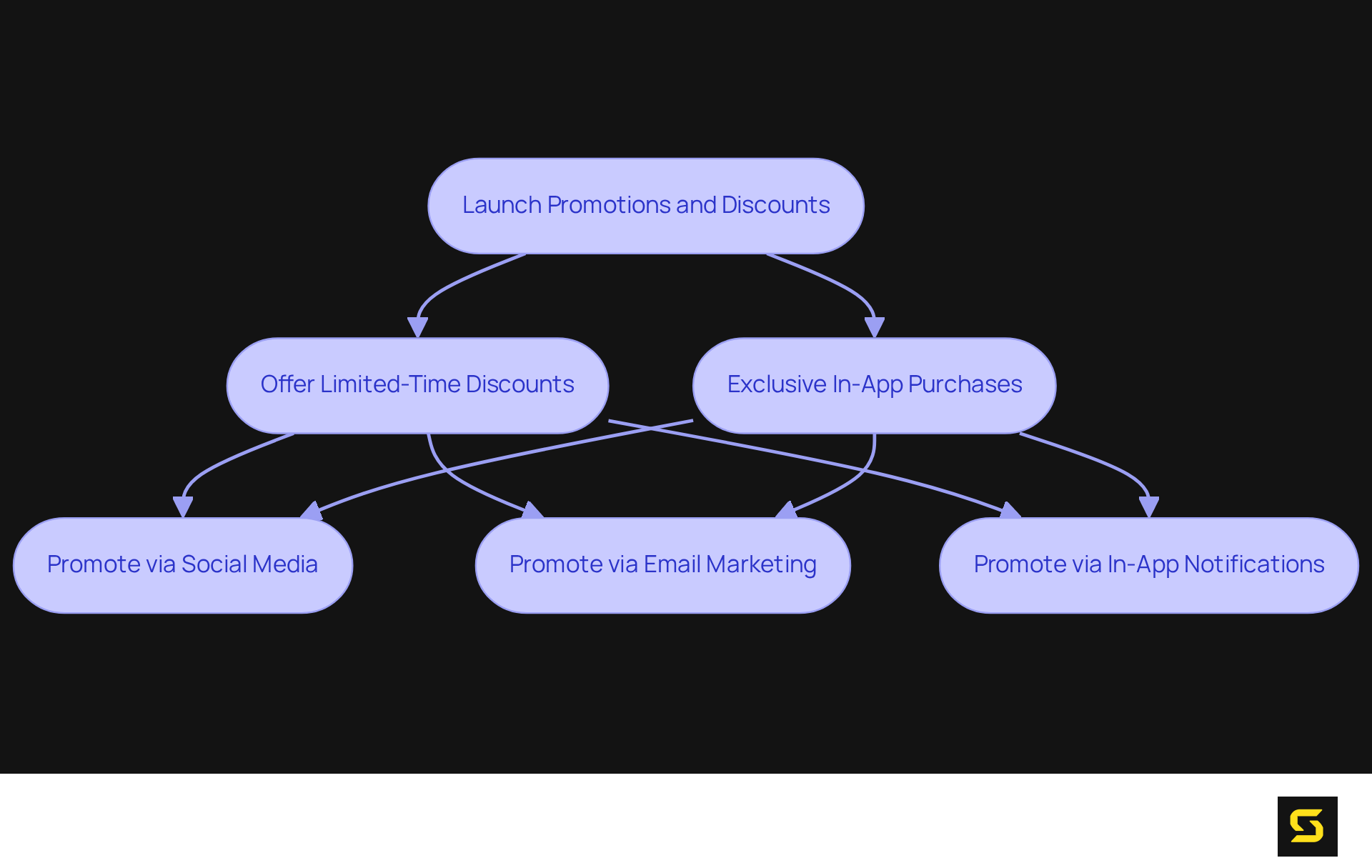
Build a Community Around Your App for Long-Term Engagement
Establishing a community around your application is essential for driving engagement and retention in the context of mobile app marketing. This can be accomplished through various channels, including:
- forums
- social media groups
- in-app features that promote interaction among users
By consistently engaging with your community through events, updates, and feedback sessions, you cultivate a sense of belonging among participants. This connection not only boosts loyalty but also propels long-term success for your app.
Effective community engagement strategies in mobile app marketing encompass:
- leveraging user-generated content
- hosting challenges or contests
- offering exclusive access to features or content for active participants
Additionally, integrating gamification elements, such as incentives for participation, can significantly enhance engagement and motivation. As Nathan Hawkes observes, "Engaged individuals are more likely to convert into paying clients or take other desired actions."
These initiatives create a vibrant environment where individuals feel valued and involved, ultimately leading to improved retention rates and a stronger brand presence in the market. To implement these strategies effectively, consider establishing a dedicated social media group where users can share their experiences and feedback, thereby and connection.
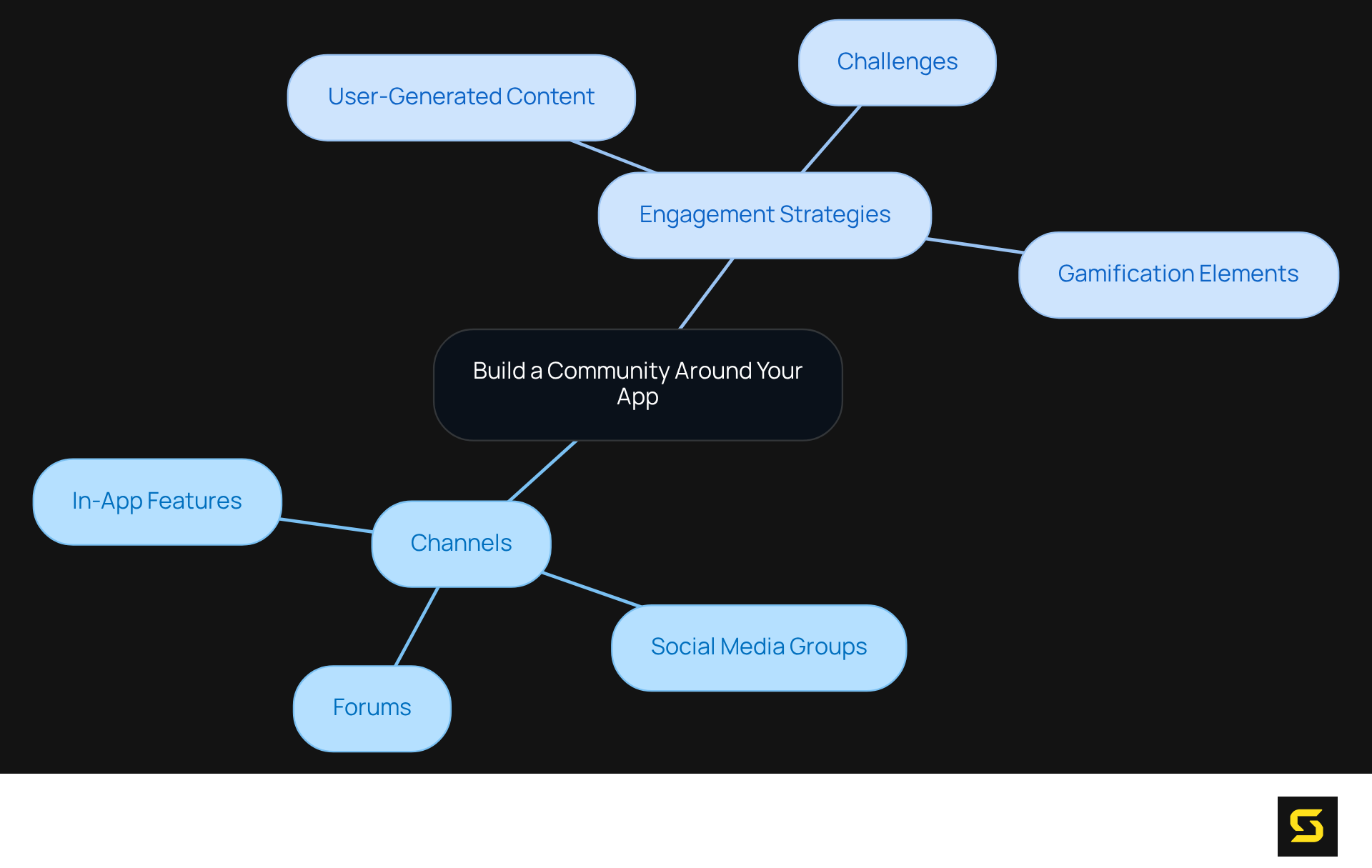
Conclusion
Building a successful mobile app marketing strategy necessitates a multifaceted approach that prioritizes customization, engagement, and community building. By focusing on tailored solutions, businesses can craft unique applications that not only meet user needs but also distinguish themselves in a competitive landscape. This commitment to personalization cultivates deeper connections with users, ultimately enhancing customer loyalty and retention.
The article delineates several key strategies for effective mobile app marketing, including:
- Leveraging social media advertising
- Forging influencer partnerships
- Optimizing app store listings
- Implementing targeted email campaigns
Each of these tactics plays a vital role in driving visibility and engagement, while data analysis and referral programs further amplify growth potential. By integrating these approaches, businesses can establish a robust marketing framework that adapts to evolving user preferences and market trends.
In conclusion, the significance of a comprehensive mobile app marketing strategy cannot be overstated. As the digital landscape continues to evolve, investing in tailored marketing techniques is essential for fostering user engagement and driving sustainable growth. Companies are urged to explore these strategies, harness the power of data, and build vibrant communities around their applications to ensure long-term success in the dynamic realm of mobile app marketing.
Frequently Asked Questions
What is the role of custom software development in mobile app marketing?
Custom software development is crucial for mobile app marketing as it ensures the creation of applications that are functional and strategically aligned with specific business goals. It enhances customer engagement and retention through advanced features and customer-focused design.
How can customized solutions benefit mobile app marketing?
Customized solutions facilitate unique promotional strategies that help an app stand out in a crowded market, effectively connecting with the target audience and fostering long-term customer loyalty.
What are the projected growth trends for the custom software development market?
The global custom software development market is projected to grow at a CAGR of 10.3% by 2028, highlighting the increasing relevance of investing in custom solutions.
How does social media advertising enhance mobile app marketing?
Social media advertising helps businesses enhance their mobile app marketing by connecting with specific demographics and interests, driving downloads, and increasing app visibility.
Can you provide an example of successful social media advertising?
Walmart's social media strategy during the Super Bowl, which engaged with 171 brand accounts, resulted in a 50% increase in mobile app downloads week-over-week, demonstrating the effectiveness of timely and relevant content.
What impact does personalized advertising have on conversion rates?
Advertisements tailored to individual preferences can increase conversion rates by as much as 300%, emphasizing the importance of personalized messaging in marketing.
Why is monitoring ad performance important in social media advertising?
Utilizing analytics tools to monitor ad performance is vital for refining marketing strategies, as brands that adjust their campaigns based on data insights can experience a rise in client acquisition of up to 25%.
What are some best practices for social media advertising?
Best practices include testing various ad formats, engaging users with interactive content, and maintaining a consistent posting schedule to keep the audience informed and engaged.
How can influencer partnerships enhance user engagement?
Partnering with influencers can significantly enhance marketing efforts by creating compelling content that showcases the app's features, leading to increased interest, downloads, and a 20% increase in audience retention compared to traditional advertising.
What percentage of individuals discover new applications through social media?
70% of individuals discover new applications through social media, highlighting the essential role influencers play in enhancing app visibility.





